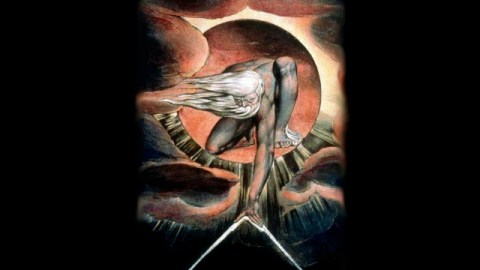Why Can’t Reason and Imagination Just Be Friends?

Back in high school, my imagination was overtaken for a year or two by the poems and engravings of William Blake (1757-1827). In particular, and only semi-consciously, I absorbed some of Blake’s wild mythology about the relationship between Urizen, a deity representing Reason and Law, and Los – the opposing force of Imagination.
Along with Blake, I came to view math and science (which, not coincidentally, were my worst subjects) as aligned with conformity and lack of spirit, soul-crushing pursuits presided over by frowning Urizen and his carpenter’s square. It didn’t help that the head of our math department was a dour, sadistic creature who delighted in nothing more than assigning students to afterschool blackboard duty for failing to bring the right type of pencil to class. Art and literature, on the other hand, were the highest products of the human spirit, limitless sources of light, energy, and hope.
Although I never made my peace with high school math and science, I have long since seen the folly of this rigid distinction between reason and imagination. Surely the greatest scientific discoveries are the product of imaginative energy and curiosity no less intense or pure than that which animates Hamlet or King Lear. Still, this marital squabble between Urizen and Los, which began perhaps in the 17th century, as rational philosophers attempted to define their methods and cast off the superstitious trappings of earlier ages, persists in various forms down to our present day. A few examples:
The various permutations of this debate sometimes serve to illustrate just how convoluted and absurd the attempt to split the human mind into two opposing forces – and to determine once and for all which one is better – can become.
C’est la politique, but for the sake of future sensitive, poetic high schoolers everywhere I’d like to see fewer irritating ad hominem public slugfests, and more brilliant, playful, experimental attempts to heal this centuries-old rift. Jad Abumrad’s public radio show Radiolab, which uses sound and narrative to delve deep into mathematical and scientific concepts, comes to mind. So does the painter Chuck Close, whose enormous portraits are composed of tiny, meticulously painted squares on a grid. Also, the Dalai Lama’s (admittedly controversial) efforts to encourage research efforts on the neuroscience of meditation. There have been some promising developments in the corporate world, as (some) businesses have come to understand the human ecosystems on which their success depends. I’m thinking, too, of the late, great David Foster Wallace, whose monumental work Infinite Jest is at once an imaginative tour-de-force on the order of, say, Alice in Wonderland – and a meticulous, Talmudic discourse (with 200+ pages of microscopic footnotes) on the human psyche.
In other words, Los and Urizen, can’t we just be friends?
—————————————————————————————————————-
*thanks to reader Reynir Orn, who pointed out my omission of engineering here, providing further evidence of my Los-ian biases…
Follow Jason Gots (@jgots) on Twitter





